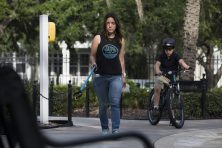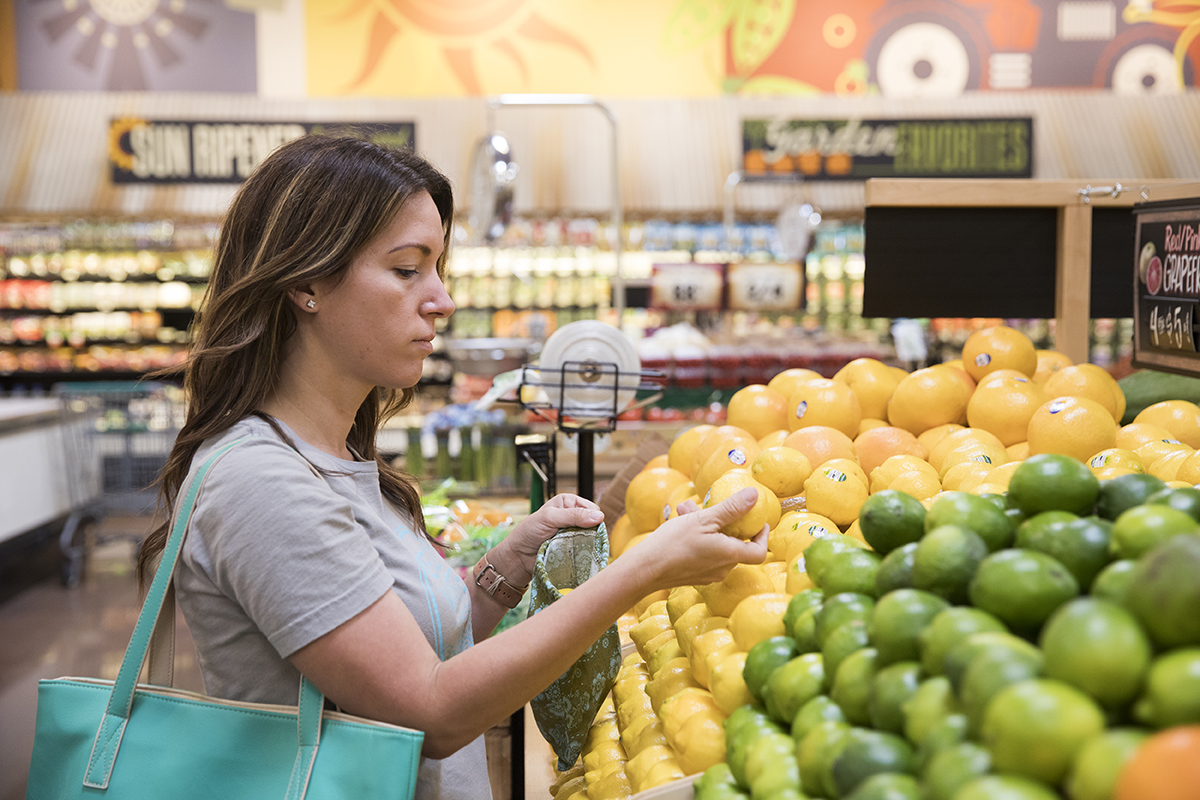How Much Trash Do You Toss? This Woman’s Goal Is a Zero-Waste Life

Imagine fitting all your trash for the month inside a Mason jar.
For many, that seems like an impossible feat. But for Graciela Vidal of Tampa, Florida, it’s a refreshing reality.
Vidal, 36, decided to adopt a zero-waste lifestyle about two years ago in an effort to benefit the environment.
She had thought she was being eco-conscious in the past by recycling and bringing her own bags to the grocery store instead of getting plastic ones. But Vidal says watching environmental documentaries like “Plastic Paradise” on Netflix really opened her eyes.
“I didn’t realize that even though something’s recyclable, it doesn’t mean that it’s actually going to be recycled. It might actually end up in our water, harming the environment and the wildlife.”
She vowed to consume less and reuse more, instead of just recycling.
Transitioning to a Zero-Waste Lifestyle

Though armed with the determination to live zero waste, Vidal found it wasn’t easy to change everything overnight.
“Actually, it was a slow process, only because a lot of the things that are reusable are a little costly,” she says. “I wasn’t able to just go out and buy everything I needed to do the switch all at once.”
One of the first changes Vidal tackled was no longer using plastic straws. She never used to buy them for home, but she started making the request for no straws whenever she went out to restaurants.
Vidal purchased a couple of reusable stainless steel straws for her son, who’s now 7, to use when they went out to eat, because it was sometimes difficult for him to drink out of a glass. She says the reusable straws cost about $1.50 to $2 each.
Vidal also swapped out using plastic resealable snack bags for a reusable version made of fabric. She bought a bunch from a woman in Clearwater, Florida, who operates the Etsy shop Bag It Conscious and also sells eco-friendly items at the Saturday Morning Market in St. Petersburg, Florida.
“That was actually one of my bigger purchases,” Vidal says, noting the reusable snack bags cost about $5 to $7 each.
In addition to the reusable bags, Vidal says, sometimes she’ll just use old, cleaned-out containers for snacks.
“Really, any container will do just fine,” she says. “And sometimes you put them in the containers, and they don’t smush your snacks, so it’s actually better.”
Another change Vidal made was to stop drinking from throwaway coffee cups. Instead, she’ll request a mug at the cafes she frequents. Or, if she can’t stay, she’ll bring her reusable to-go cup — which cost about $25 — and ask the barista to fill it up.
Vidal says she even started bringing her own Mason jars to smoothie shops to use instead of plastic cups.
“You just have to ask,” she says. “It’s a little unnerving sometimes because people look at you weird, but if you just say, ‘Hey, I care about the environment, [and] I don’t believe in using single-use plastics or disposable items,’ then they’ll understand where you’re coming from and they’ll be more than happy to put it in your own container for you.”
Shopping Zero Waste

To decrease the amount of waste she produces, Vidal grocery shops at bulk stores.
“One of the easiest things about shopping is here in Tampa we’re fortunate that we have a Whole Foods and we have Sprouts and Rollin’ Oats,” she says. These grocery stores allow shoppers to buy items in bulk that are usually available only prepackaged at other stores.
“And they’re very accommodating,” she says. “You can use your own bags and your own containers to fill up on your bulk items at those stores.”
For those who don’t live near stores that have bulk sections, Vidal recommends cutting back on packaging waste by buying the largest quantity of the product available. For example, if you took home a 20-pound bag of rice, you’d end up with less plastic to dispose of than if you bought 20 one-pound bags of rice over time.
Buying food in larger quantities is often less expensive on a cost-per-unit basis.
Vidal admits she isn’t perfect in her pursuit of a zero-waste lifestyle. She also switched to a vegan diet two years ago and has found instances where being vegan has clashed with living zero waste.
“Most of the cheese alternatives and meat alternatives, they’re all wrapped in plastic,” Vidal says.

That packaging usually results in the largest share of her plastic waste, but she tries to limit those purchases. Vidal also occasionally gives in to prepackaged goodies for her son, like a bag of chips to take to the beach.
“He knows that’s like a treat that happens like once a month,” she says.
Vidal has learned to ignore the lure of convenience items. She does her best to feed her family whole foods, which saves money. Vidal makes her own lemonade and orange juice. Food waste goes into a compost pile.
Vidal’s zero-waste life extends beyond food and drink. Instead of buying cleaning supplies at the store, she makes her own out of vinegar and citrus peels. Coconut oil and baking soda form the base of the deodorant and toothpaste she concocts.
For hand-washing, Vidal buys bar soap that’s not wrapped in plastic. The laundry detergent she uses also comes in a bar form from an Etsy seller, Tangie, based in Eustis, Florida.
“You just dilute it in water and you put it in your own container,” Vidal says. “You can even use your old laundry detergent container.”
She hasn’t quite found a zero-waste solution to buying dish-washing soap, though.
“So I just buy the largest concentrated biodegradable soap I can find,” Vidal says. “It lasts me at least six months.”
Making a Bigger Impact

Vidal could have limited her eco-conscious ways to herself and her household, but she felt compelled to spread the message to others.
About a year ago, she founded Zero Waste Tampa Bay, a group that spreads awareness of living a zero-waste lifestyle. She’s working on making it a nonprofit.
As president of Zero Waste Tampa Bay, Vidal has organized Meetups to unite other like-minded people in her community. She also visits local restaurants and shops to initiate conversations about what business owners and managers can do to reduce their environmental impact.
“I just try to spread my message and try to enlighten people because I was the same way a couple years ago,” Vidal says. “I didn’t know the effects on the environment for every choice I was making in my daily life.”
She says people shouldn’t feel intimidated about the zero-waste lifestyle or feel like they must be 100% waste-free.
“You can’t cut everything out of your life,” Vidal says. “It’s impossible.”
It’s all about making small changes over time, she says.
Vidal knows if she can get one person to make a small change and that influences another person, the ripple effect can make a significant positive difference.
Nicole Dow is a staff writer at The Penny Hoarder.
















